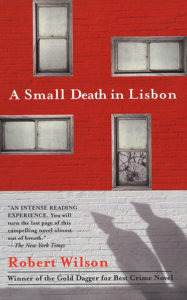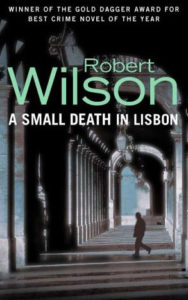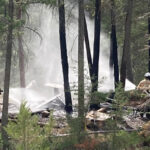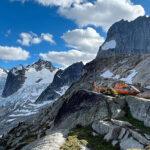Home »

Robert Wilson’s setting boosts this book
Book Review
By Derryll White
 Wilson, Robert (2000). A Small Death In Lisbon.
Wilson, Robert (2000). A Small Death In Lisbon.
After wandering for weeks in the rural beauties of the Alentego region of Portugal, looking at farms and thinking that there was an appeal, I came to the shock of Lisbon. At my first bookstore, however, I found this novel written by a man who did just that, bought a rural farm in Portugal and began writing books. A smart man, I thought, I must read ‘A Small Death In Lisbon.’
I don’t normally like parallel story lines divided by time and context. This technique asks the reader with some regularity to suspend the flow of the story and pick up new characters and time period. I usually find these structured interruptions bothersome, and I did here to some extent.
Robert Wilson is careful with details, working complex scenes with precision and sensitivity, keeping it all believable – even the worst. He has a sex scene between Inspector Zé Coelho and Luisa Madrugada that is as inspiring, clean and imagistic as any I have read.
Wilson does treat Portugal well here, making the country and its people perhaps the most interesting character of all. A clear sense of geography comes through, as well as a reverence for the people. He gives some good inside tips on both the food and wine of the country.
I found the scope of the story – early Second World War to the end of the twentieth century – too large. I felt as though I was having to consult a calendar to place myself. But would I read another of Robert Wilson’s books? Definitely yes if it was set in Portugal.
********
HISTORY – “You’re right,” said Antonio, suddenly between us, “’history’, a weight, a dead weight too… isn’t that right Senhor Rodrigues?”
Senhor Rodrigues belched politely into his hand, not used to proletarian drink.
“History repeats itself,” he said and even Antonio laughed – the communist who can smell the pork meat of a capitalist when they’re roasting him as far away as the Alentejo.
“You’re right,” said Antonia. “History’s only a weight to those that lived it. For the next generation it’s no heavier than a few school books and forgotten with a glass of beer and the latest CD.”
BEARDS – “You’re handsome. There were those who thought you were hiding a weak chin under there.”
“Is that what people think these days,” I said, running for cover, “that men grow beards to hide something? When I was a kid everybody had a beard.”
“Why do men grow beards?” she said, genuinely perplexed.
“The same reason dogs lick their balls,” said Carlos, pen poised. Our heads snapped round. “Because they can,” he finished.
PORTUGAL – There were big fans of Cascais but I wasn’t one of them. It used to be a small fishing village with houses falling down steep cataracts of cobbled streets to the harbour and port. Now it was a townplanner’s nightmare, unless you were one of the townplanners who’d passed the numerous development projects in which case you’d be living a dream elsewhere. It was a tourist town with an indigenous population of women who dressed to shop, and men who shouldn’t be allowed out of a nightclub.
MOUNTAIN PEOPLE – “They’re difficult people in the Beira.”
“They’re mountain people. Mountain people are always difficult. They have hard, cold lives.”
BUSINESS – “Ah, yes, the bureaucracy,” said the chefe, suddenly feeling trussed in his uniform. “You’re a businessman. I understand. Businessmen like to do what they want, when they want
FAMILY – The family. The strongest unit of Portuguese currency. Our gold. Our greatest asset. The pure element that keeps our streets mostly clean. Nobody in Europe understands the value of the family better than us and its not just leftover Salazar propaganda.
HOLOCAUST – “I’ve told you these things,” said Lehrer, ‘Because this could take as long as five years for the world to forget and during that time any association with the SS will be very dangerous. If you are going to stay here [Portugal] … and there’s no reason why you shouldn’t… you must keep quiet about those things and when they are mentioned say nothing.”
LISBON – “You know why Lisbon’s a sad place,” I said. “It’s never recovered from the history. Something terrible happened here which marked the place for ever. All those shaded, narrow alleyways, the dark gardens, the cypresses around the cemeteries, the steep cobbled streets, the black and white calgada in the squares, the views out over the red roofs to the slow river and the ocean… they’ve never shrugged off the fact that almost the entire population of the city was wiped out in an earthquake that happened nearly 250 years ago.”
FAME – I’ve never wanted fame. If I’d wanted to be famous I wouldn’t have been a policeman. Fame has always struck me as a perverse form of prostitution. You perform, or just appear, and in return receive enormous attention, an uncomplicated love. Nobody knows the famous and the famous know nobody and yet the intensity of emotion, the wholesale adoration is bigger, more aggressive than any individual’s love.
– Derryll White once wrote books but now chooses to read and write about them. When not reading he writes history for the web at www.basininstitute.org.








